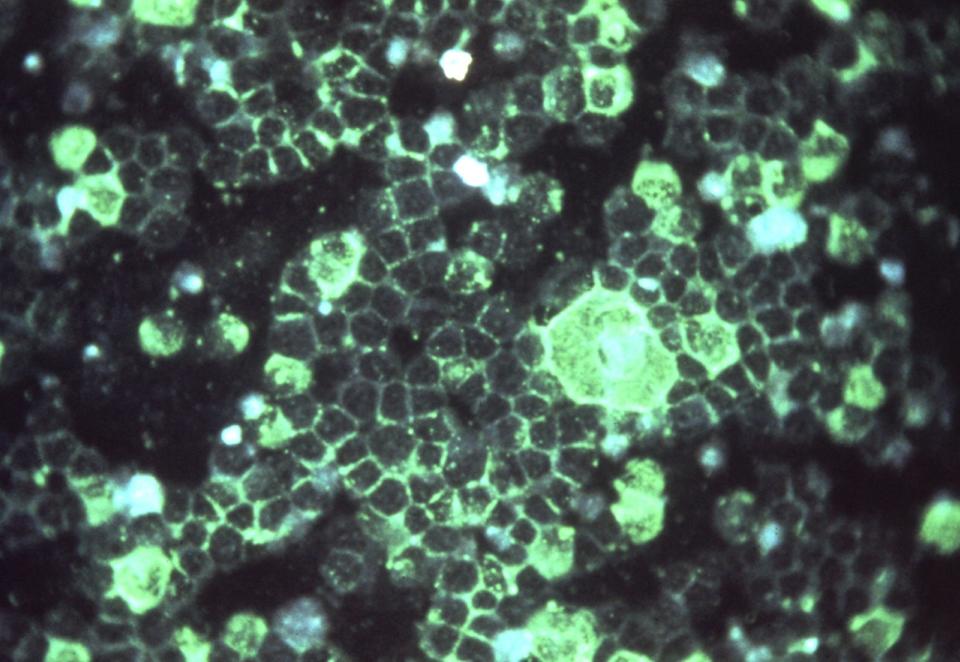Surge in RSV cases stretching national, South Bend region pediatric health care systems
SOUTH BEND — The unseasonably early surge in respiratory syncytial virus — or RSV — cases that overwhelmed the nation's health care system in recent weeks is affecting the South Bend region, as area pediatricians grapple with the cold-like illness that kills more than 14,000 children and seniors across the country annually.
Nationwide, cases have jumped about 70% from more than 4,600 to nearly 8,000 in the past month, according to the Centers for Disease Control and Prevention. As a result, the nation's pediatric hospital beds are more full now than they've been in the past two years, according to reports.
The South Bend region is seeing similar trends. Hospitals such as Beacon Children's are stretched to their limits, and health care officials are scrambling to find additional pediatric beds to treat the influx of RSV patients.
The spike in cases this month is unusual. Typically, RSV cases peak between November and December, and then again in the spring, said Dr. Kate Dutkiewicz, medical director of Beacon Children's Hospital. In the past two weeks, area hospitals have seen an influx of children from newborns to 5 years old with respiratory complications caused by RSV, she said.
AAP guidelines on RSV:Read more about RSV.
The situation is so dire, Dutkiewicz said, that Chicago area hospitals have sent patients to South Bend when there were beds available during the past several weeks. But the hospital floors have been full many of those times, she said.
The pandemic's effect
Although RSV has a history of affecting preemies and infants less than six months old, newborns to children up to 5 years old are being hospitalized with significant respiratory problems, Dutkiewicz said.
Typically, newborns and infants ages 2 and younger are exposed to RSV, having colds that pass, the medical director said. That age group generally is infected and builds immunity, and are less symptomatic, Dutkiewicz said, noting that many RSV cases do not require hospitalization.

But the pandemic and its guidelines of masks, social distancing and hand washing offered much less chance for children to be exposed to viruses such as RSV, lessening exposure and the subsequent immunity from the virus. RSV cases were down during the lockdowns, but they have surged this season as the masking and social distancing practices have been relaxed.
Dr. James Harris, spokesman for the South Bend Clinic, said this season's cases also have been "overwhelming" at his facility.
Harris said even he, as an allergist and immunologist, has seen RSV cases and he has been in contact with parents and daycare providers who are seeing the illness run rampant in children.
The American Academy of Pediatrics says the number of RSV and other respiratory illnesses, including influenza, are rising this fall.
Officials from St. Joseph Regional Health System also confirmed this week that the RSV cases this season have begun to rise earlier than past years.
Ironically, both Dutkiewicz and Harris said the very same strategies that people were asked to adopt to lessen the chances of catching COVID-19 — washing hands, social distancing, staying home when sick — are the same steps people can take now to avoid RSV infection.
Share the road:How a busy road claimed an adventurous priest on his bike
Health officials also are recommending people get flu shots as well as the COVID-19 booster shots this fall. Harris said the flu shots offer some protection from some of the associated complicating symptoms that may ensue with RSV.
What to look for
On its healthychilren.org website, the American Academy of Pediatrics says RSV can often cause a cold in children that could turn into bronchiolitis or pneumonia. Cold symptoms include fever, coughing, runny nose, sneezing, fussiness and poor feeding.
Bronchiolitis adds wheezing, fast breathing and grunting when breathing in addition to cold symptoms.
Harris recommends parents monitor children with cold symptoms and watch for the wheezing, temperatures that rise to 103 or 104, and to seek medical attention.
Proactive help:With 11 questions, cops and YWCA protect domestic violence victims
Dutkiewicz explained the progression of what appears to be a cold that shows signs of RSV in children involves high temperatures, wheezing and breathing difficulties, and poor eating and drinking.
In days 5-7 of what seems to be a cold, she recommends parents call a doctor if children begin to show those symptoms.
"Typically, days 5-7 are the worst (with RSV)," she said. "If the children get worse, they should contact their primary care physician."
RSV is spread mainly by droplets, Dutkiewicz said, and she recommends keeping children home when sick and trying to keep sick ones away from others.
Help on the way?
Harris pointed out the South Bend Clinic has been part of a vaccine research study for RSV, both in children and seniors. He said drug companies are working to provide a vaccine as early as 2023 as research findings are set to be published in the coming months. Currently, there is no vaccine for RSV.
About 58,000 children younger than 5 and 177,000 adults 65 and older are hospitalized with RSV annually across the country, according to the CDC. In addition, 14,000 adults 65 and older die from the virus each year, the agency said.
RSV by the numbers:
● 2.1 million outpatient (non-hospitalization) visits among children younger than 5 years old.
● 58,000 hospitalizations among children younger than 5 years old.
● 177,000 hospitalizations among adults 65 years and older.
● 14,000 deaths among adults 65 years and older.
● 100–300 deaths in children younger than 5 years old.
Source: Centers for Disease Control and Prevention
Email Tribune staff writer Greg Swiercz at gswiercz@sbtinfo.com.
This article originally appeared on South Bend Tribune: Surge in RSV cases stretching Michiana children's hospitals to their limits

